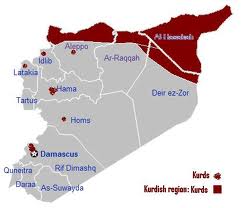QAMISHLO, — The Supreme Kurdish Council (SKC) condemns Qamishlo explosion and decides to form a specialized committee to organize and lead all security and self-defense formations.
In a public statement to the public opinion, the Supreme Kurdish Council condemned the explosion, which took place on 30.09.2012 killing at least 6 innocence people and injuring dozens.
The Supreme Kurdish Council’s statement included that ‘the Supreme Kurdish Council held its regular meeting on the 3.10.2012, and discussed a number of issues regarding the Kurdish arena in particular and the internal situation the country as the crisis escalating and exacerbating’
In this context’ the meeting condemned the explosion, which took place on 30.09.2012, killing a number of innocent citizens, injuring others as well as causing a crucial damage to the properties of people of Qamishlo. Such a terrorist act aims at causing a state of fear and panic among the people of Qamishlo and other cities in the region which is relatively stable comparison with other parts of Syria’
As they also considered’ the Turkish violations along the border zones in the Kurdish area, which resulted in the death of a member of public security unites and injured two others while in duty patrolling nearby Al-Derbasiye city. Such an act by the Turkish government is fully condemned and denounced as it aims at destabilizing the Kurdish region’
The Supreme Kurdish Council took a number of decisions ‘such as establishing a specialized committee to organize and lead different public security formations on the ground; and called upon YPG (Public Security Unites) as those unites are submitted to the Supreme Kurdish Council to comply with its decisions and to submit to the specialized committee for this purpose as this committee is the core of the Kurdish public protection forces’
As well they decided ‘the establishment of reconciliation and justice committees as setting a date for a joint-meeting between the two councils ‘the Kurdish National Council and the people’s Council of Western Kurdistan’
